Calvin takes centre stage in Geneva
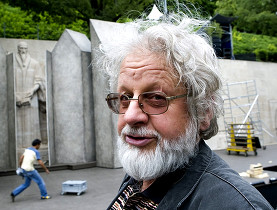
As part of the 500-year celebrations of the birth of Protestant reformer John Calvin, Geneva is staging an open-air play about the controversial figure.
swissinfo.ch took a behind-the-scenes look at the new play “Geneva in flames”, which runs from July 1-26, and which aims to give a more differentiated view of the man behind the legend.
“The play describes the stormy, passionate, painful, difficult relationship between the main character, Calvin, and his rival, the city of Geneva. Geneva is in flames in all senses of the term,” explained director François Rochaix, at a rehearsal at the Parc des Bastions in Geneva.
Calvin was a French Protestant theologian and a central developer of Calvinism, or Reformed theology. Geneva is the city most associated with Calvin, where he sought exile from 1536 to his death in 1564. His ministry attracted other Protestant refugees and over time made Geneva a major force in the spread of Reformed theology.
“He’s someone who affects all of us here in French-speaking Switzerland, even though we don’t like to admit it,” said Michel Kullmann, who plays Calvin.
Rochaix added that modern-day Geneva suffered from a huge Calvin complex.
“Here we blame him for all the shortcomings of the Geneva people, but abroad he’s perceived differently. Apart from his image of being merciless and strict, he was one of the most important people who helped create a bridge from the Renaissance to modern times,” he said.
But playwright Michel Beretti felt many people had a one-dimensional image of Calvin.
“It’s a fixed idea, inherited from the 19th century,” he told Le Temps newspaper. “Calvin has always been in conflict with Geneva. I tried to understand how a community decides to voluntarily place itself under a restrictive law and to build an exemplary city.”
“Popular Shakespeare-like play”
The organisers want to mark Calvin’s anniversary year in style. “Geneva in flames” costs SFr2million ($1.8 million) to put on, with a cast of 40.
The setting for the outdoor play is unusual – and slightly intimidating – said Rochaix.
“We play in front of the Reformers’ Wall, where Calvin is present, and a few hundred metres from the cathedral where you hear the church bells. We sing psalms which are still sung at the cathedral and we do that in the centre of the Geneva, which is known as the City of Calvin,” said Rochaix.
Despite the play’s dramatic name, there will be no fireworks or extravagant scenes on the 30-metre-wide stage.
Unlike his previous spectacular outdoor productions, such as the opening of the Expo 02 in Neuchâtel or the Fêtes des Vignerons festival in Vevey, Rochaix said this time he wanted to “create a popular Shakespeare-like play” for the general public with Calvin as a “theatrical character” showing his many contradictions and battles.
Clichés
The director hoped the play would be an opportunity to deconstruct some of the clichés and unfavourable images surrounding the character.
Critics have painted the French theologian as an austere humourless scholar who built his ecclesiastical court in Geneva to further his political aims and maintain his sway over civil and religious life. It is argued that he responded harshly to any challenge to his authority.
During his time in Geneva Calvin drew up an extensive catalogue of austere rules of morality. These ranged from bans on swearing, gambling and fornication to a strict no to dancing, even at weddings. Unexcused absence from worship service was penalized.
Adultery and homosexuality could draw tough sentences, even death.
The negative image of Calvin in western Europe has also been shaped by the execution of Michael Servetus, a Spanish theologian whose non-orthodox views were judged by Calvin as heretical. When he sought refuge in Geneva, Servetus was imprisoned and burned at the stake.
Revolutionary figure
“Before starting this play I thought it wouldn’t be much fun playing him but you discover that he has an extraordinary story with lots of ups and downs and dramatic episodes in his personal, political and theological life,” said Kullmann.
But the play does not try to rehabilitate the character or proselytize, he added.
“We want to show that Calvin was a very important man and whatever people think, we can’t ignore what he has contributed, even if this has been exploited positively or negatively,” said Kullmann.
“We especially remember his extremely severe, authoritarian, even dictatorial side, but we shouldn’t forget the context of that period. He was defending something revolutionary.”
Calvin was the first to systematise the Reform movement allowing the churches to get organised. He introduced a radical church constitution based on the democratic principles of division of powers.
It took more than ten years before the Reformation consolidated its position against native discontent. Calvin also had to cope with social conflicts between the Geneva’s citizens and the thousands of French and other refugees seeking exile in the city.
And his influence extended to many other areas, said Rochaix.
“There’s a whole series of things that he invented. Like putting an end to labour conflicts. He wanted discussions between the employers and the workers. He demanded lower interest rates for loans to poor people and appropriate salaries,” he said.
“His instincts, his intuition, his need for justice and equality between the people, respect for the working class and the poor – this was completely new in the 16th century. And I believe that unfortunately, this is a battle that still needs to be continued today.”
Simon Bradley in Geneva, swissinfo.ch
This year marks the 500th birthday of the religious reformer whose ideas shaped the Protestant Church. In his honour Protestant denominations have designated 2009 Calvin Year.
A selection of the main Geneva events; see website for full list:
April 24-October 31: “A day in the life of Calvin” exhibition at International Museum of the Reformation, Geneva
July 1-26: John Calvin theatre play by François Rochaix, Reformers’ Wall, Geneva.
July 1-26: Huguenot village exhibition, Reformers’ Wall, Geneva
July 10: Ceremony to mark the 500th anniversary of Calvin’s birth, Reformers’ Wall, Geneva.
August: Open air street theatre in Geneva Old Town.
October 1-3: “Airport Chapel” theatre play by Sketch’Up, Theatre de L’Espérance, Geneva.
November 1: Concert at St Pierre Cathedral, Geneva.
Born in northern France, but most closely associated with Geneva, where he was a minister for most of his life.
Calvin’s ideas, actions and sermons contributed to the Protestant Reformation movement and transformed Geneva into an intellectual capital in Europe.
Originally trained as a humanist lawyer, Calvin broke from the Roman Catholic Church in the 1520s. After religious tensions provoked a violent uprising against Protestants in France, Calvin fled to Basel, Switzerland, where in 1536 he published the first edition of his seminal work, “Institutes of the Christian Religion”.
Later invited by William Farel to help reform the church in Geneva. The city council resisted the implementation of Calvin and Farel’s ideas, and both men were expelled. Calvin proceeded to Strasbourg, where he became the minister of a church of French refugees.
Continued to support the reform movement in Geneva, and was eventually invited back to lead its church. Following his return, he introduced new forms of church government and liturgy.
During this period, Michael Servetus, a Spaniard known for his heretical views, arrived in Geneva. He was denounced by Calvin and executed by the city council. Calvin spent his final years promoting the Reformation both in Geneva and throughout Europe.
In the late 18th century Calvinist-descended churches began to take root across the United States. Gradually, the movement spread to other parts of the world but the Reformed church became deeply divided. The World Alliance of Reformed Churches says its fellowship now includes 75 million Reformed Christians in more than 100 countries. But in Geneva, Reformed Christians have long since shrunk to a small minority.

In compliance with the JTI standards
More: SWI swissinfo.ch certified by the Journalism Trust Initiative

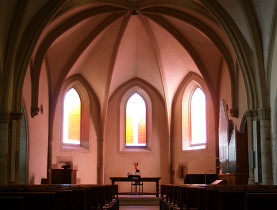
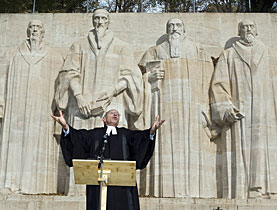
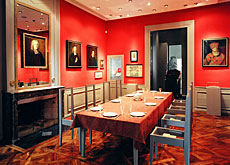
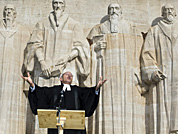
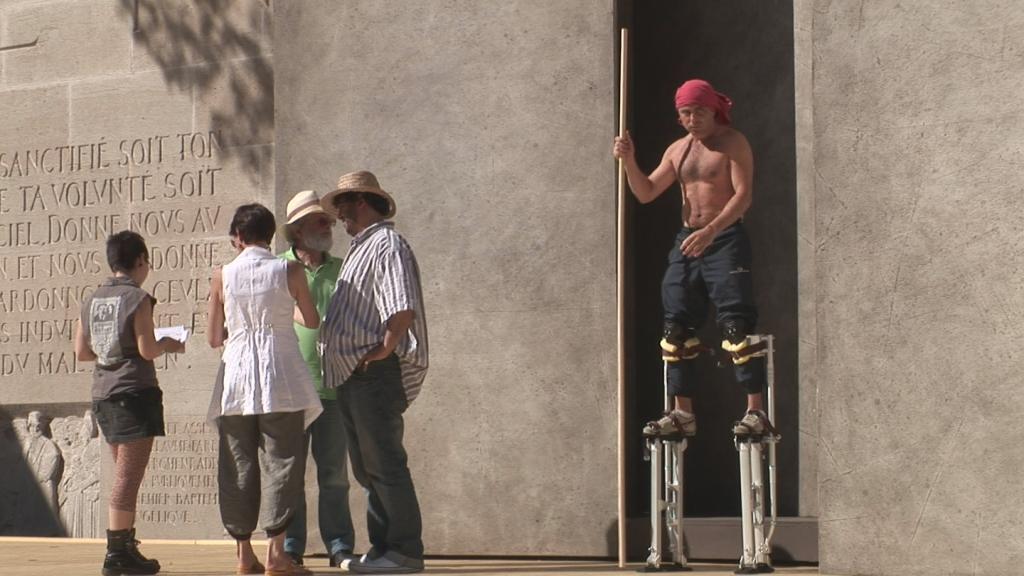
You can find an overview of ongoing debates with our journalists here. Please join us!
If you want to start a conversation about a topic raised in this article or want to report factual errors, email us at english@swissinfo.ch.